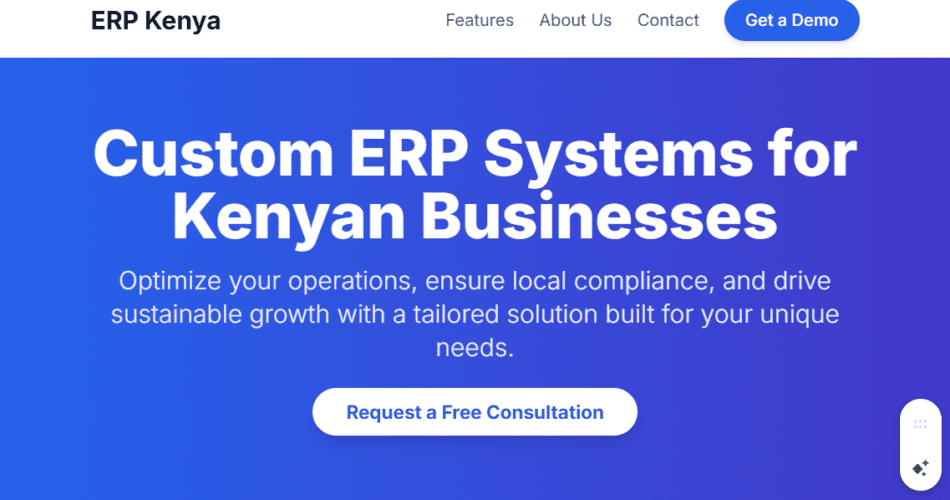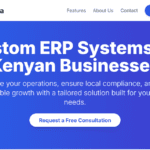Custom ERP System Kenya:
- Delivery Time2 Weeks
- English levelProfessional
- LocationUSA, United Kingdom, United Arab Emirates, New York, Kilimani, Kenya, Dubai, CBD Nairobi, Canada, Australia
Service Description
The cost of Custom ERP System in kenya is 2550000KES . Get Custom ERP system in Kenya at a price of 2500000KES at Black Shepherd Technplogies
Custom ERP System Kenya: Boost your business with a tailored ERP solution designed for the Kenyan market. Our bespoke systems integrate finance, inventory, HR, and CRM, ensuring local compliance (KRA iTax) and seamless operations. Get a scalable, secure, and user-friendly platform that automates processes and provides real-time insights, helping you achieve sustainable growth. Start your digital transformation today with a solution that perfectly fits your unique business needs.
Developing a custom ERP (Enterprise Resource Planning) system in Kenya offers a powerful solution for businesses looking to optimize their operations, gain a competitive edge, and scale effectively. Unlike off-the-shelf software, a bespoke ERP system is meticulously crafted to address the unique challengeshttps://blackshepherd.co.ke/wp-admin/edit-tags.php?taxonomy=service_category&post_type=service, workflows, and regulatory landscape of a Kenyan enterprise. This tailored approach ensures that the system aligns perfectly with the company’s specific needs, from inventory management and financial accounting to human resources and customer relationship management. The result is a unified platform that integrates all core business processes, providing a single source of truth and eliminating data silos.
One of the primary benefits of a custom ERP system is its ability to handle the complexities of the local market. For instance, it can be designed to comply with specific Kenyan tax regulations (such as KRA’s iTax system), local labor laws, and industry-specific standards. This level of localization is often difficult to achieve with generic, international ERP solutions. Furthermore, a custom system can be developed to integrate with local payment gateways, supply chain partners, and other critical business services, streamlining operations and reducing manual data entry.
The development process for a custom ERP system in Kenya typically begins with a thorough needs assessment and discovery phase. Experienced developers and business analysts work closely with the client to understand their current processes, identify pain points, and define the desired functionality. This collaborative approach ensures that the final product is not only technically sound but also highly user-friendly and relevant to the day-to-day operations of the staff. The system is then built using modern, scalable technologies, ensuring it can grow with the business and adapt to future changes. This flexibility is a key advantage, as it allows for the addition of new modules or features as the company’s needs evolve, without the need for a complete system overhaul.
For small and medium-sized enterprises (SMEs) in Kenya, a custom ERP system can be a game-changer. It provides the same level of sophistication and control as systems used by large corporations but at a fraction of the cost, as it is designed to include only the necessary features. This avoids the bloat and complexity of enterprise-level software, making it more affordable and easier to implement. By automating repetitive tasks, improving data accuracy, and providing real-time insights through dashboards and reports, a custom ERP system frees up valuable time and resources, allowing management to focus on strategic growth and innovation.
Security is another critical aspect of a custom ERP system. Developed locally, it can be hosted on secure Kenyan servers, ensuring data sovereignty and compliance with local data protection laws. The system can also be built with robust security features, including role-based access control, data encryption, and audit trails, to protect sensitive business information from unauthorized access. Regular maintenance and support from a local team of developers ensure that the system remains secure, up-to-date, and fully functional.
In the dynamic and competitive Kenyan business landscape, a custom ERP system emerges as a critical enabler of long-term success. It represents a strategic shift from merely reacting to market changes to proactively shaping business outcomes. The key takeaway is that an off-the-shelf solution, while seemingly convenient, often forces a business to adapt to the software’s limitations rather than the other way around. A custom system, however, empowers a business to define its own digital destiny.
This digital transformation goes beyond mere efficiency gains. By unifying disparate functions—from procurement to sales and from HR to financial reporting—the system breaks down departmental silos and fosters a culture of collaboration and transparency. Management gains unprecedented visibility into every aspect of the business through real-time dashboards and analytics. This data-driven approach enables more informed decision-making, allowing leaders to identify trends, mitigate risks, and seize new opportunities with confidence. For a Kenyan enterprise, this means being able to respond swiftly to market shifts, manage supply chain disruptions, and ensure compliance with local regulations, all from a single, centralized platform.
Furthermore, a custom ERP is an investment in future readiness. As a business scales, its needs will inevitably evolve. A bespoke system is designed with this flexibility in mind, allowing for the seamless integration of new modules, technologies, and features without the need for a costly and disruptive overhaul. Whether it’s adding a mobile app for field staff, integrating with a new e-commerce platform, or incorporating AI-driven forecasting, the custom ERP serves as a robust and adaptable foundation. This forward-thinking approach ensures that the business remains agile and innovative, capable of sustaining growth and maintaining its competitive edge for years to come. Ultimately, a custom ERP system is not just a tool for today’s problems but a strategic asset that will drive a Kenyan business toward a more profitable and sustainable future.








